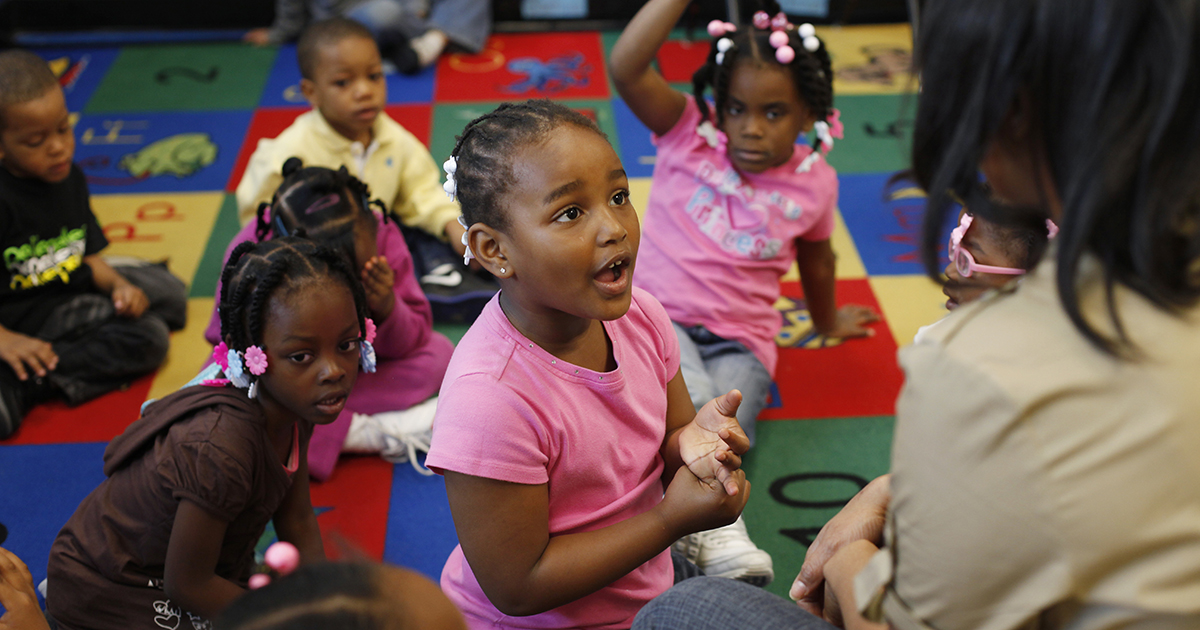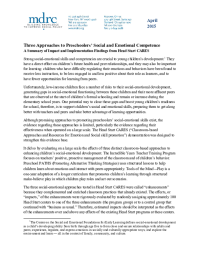Three Approaches to Preschoolers’ Social and Emotional Competence
A Summary of Impact and Implementation Findings from Head Start CARES

Strong social-emotional skills and competencies are crucial to young children’s development.[1] They have a direct effect on children’s future health and peer relationships, and they may also be important for learning: children who have difficulty regulating their emotions and behaviors have been found to receive less instruction, to be less engaged in and less positive about their role as learners, and to have fewer opportunities for learning from peers.
Unfortunately, low-income children face a number of risks to their social-emotional development, generating gaps in social-emotional functioning between these children and their more affluent peers that are observed at the start of children’s formal schooling and remain or increase during the elementary school years. One potential way to close these gaps and boost young children’s readiness for school, therefore, is to support children’s social and emotional skills, preparing them to get along better with teachers and peers and take better advantage of learning opportunities.
Although promising approaches to promoting preschoolers’ social-emotional skills exist, the evidence regarding these approaches is limited, particularly the evidence regarding their effectiveness when operated on a large scale. The Head Start CARES (“Classroom-based Approaches and Resources for Emotion and Social skill promotion”) demonstration was designed to strengthen this evidence base.
It did so by evaluating on a large scale the effects of three distinct classroom-based approaches to enhancing children’s social-emotional development. The Incredible Years Teacher Training Program focuses on teachers’ positive, proactive management of the classroom and of children’s behavior. Preschool PATHS (Promoting Alternative Thinking Strategies) uses structured lessons to help children learn about emotions and interact with peers appropriately. Tools of the Mind—Play is a one-year adaptation of a longer curriculum that promotes children’s learning through structured make-believe play in which children play roles and act out scenarios.
The three social-emotional approaches tested in Head Start CARES were called “enhancements” because they complemented and enriched classroom practices that already existed. The effects, or “impacts,” of the enhancements were rigorously evaluated by randomly assigning approximately 100 Head Start centers to one of the three enhancements (the program group) or to a control group that continued with “business as usual.” Therefore, estimated impacts should be interpreted as the effects of the enhancements over and above any effects of the existing Head Start programs at these centers.
The first challenge was to implement these enhancements on a large scale — in over 300 classrooms in the more than 100 Head Start centers — in a relatively short time, with Head Start teachers who have a wide range of credentials and skills. A comprehensive professional development package that included teacher training, coaching, and related technical assistance was intended to accomplish this goal, and MDRC and the enhancements’ developers showed that this package did indeed change teachers’ classroom practice in the desired ways. On average coaches and trainers rated implementation across the year for each enhancement at or above a satisfactory threshold for quality implementation. Compared with the control classrooms, each enhancement also improved the specific teacher practice it was meant to affect: The Incredible Years improved teachers’ classroom management, PATHS bolstered teachers’ social-emotional instruction, and Tools of the Mind—Play increased the degree to which teachers structured peer interactions and play.
Two of the three enhancements also showed consistent positive impacts on a range of children’s social-emotional outcomes in preschool, although not always as predicted.
- As expected, Preschool PATHS showed small to moderate improvements in children’s knowledge and understanding of emotions, social problem-solving skills, and social behaviors.
- The Incredible Years improved children’s knowledge and understanding of emotions, social problem-solving skills, and social behaviors. It did not produce expected impacts on children’s problem behavior and self-regulation (except for the highest-risk children).
- Tools of the Mind—Play did not demonstrate expected impacts on self-regulation; its only positive impacts were on children’s knowledge of emotions.
There was no consistent evidence that the enhancements improved children’s pre-academic skills during preschool, although those skills were not targets of the enhancements. There were virtually no impacts on outcomes in kindergarten as reported by teachers and parents (although this finding is based on very limited information).
Two more exploratory studies were conducted. An exploratory analysis considering only the limited number of 3-year-olds included in Head Start CARES classrooms found that The Incredible Years improved teacher reports of these children’s social behaviors and closeness with their teachers. A sister study also showed that it was possible to successfully adapt Preschool PATHS for use with the children and families of migrant and seasonal workers.
[1]The Center on the Social and Emotional Foundations for Early Learning defines social-emotional development as a child’s developing ability from birth through age five to form close and secure relationships with adults and peers; experience, regulate, and express emotions in socially and culturally appropriate ways; and explore the environment and learn — all in the context of family, community, and culture.






